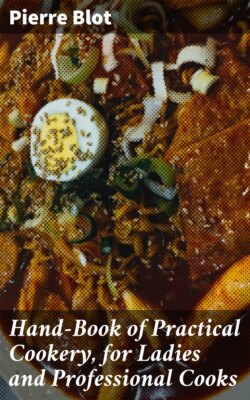Читать книгу Hand-Book of Practical Cookery, for Ladies and Professional Cooks - Pierre Blot - Страница 125
На сайте Литреса книга снята с продажи.
SAUCES.
ОглавлениеTable of Contents
There is no good cooking possible without good sauces. Many excellent pieces of meat, etc., are spoiled by being served with a poor sauce.
Let every one bear in mind that water is no substitute for broth; that vinegar or water is no substitute for wine, etc.
There is no place where the old proverb can be better applied than in the kitchen, "Waste not, spare not."
The French, Italians, Spaniards, and Germans, use broth and wine in their cooking, and do not spend as much as the Americans for their food; they could not afford it; but they waste not, neither do they lose any thing good through carelessness or prejudice.
Good sauces are not as difficult to make as is generally believed.
This general belief comes from the fact that many, after having partaken of a certain dish somewhere, and liking it much, ask of their own cook to prepare the same.
The cook, most probably, has never heard of it, but nevertheless prepares a dish which is hardly eatable, and is to the other what a crab-apple is to a raspberry.
The most important thing in making a sauce is for the cook to put his or her whole attention and care to it.
Most sauces must be stirred continually while on the fire, and especially white sauces, such as Béchamel, Béchamel with cream or cream sauce, and white sauce.
It is necessary to stir all sauces now and then, to prevent the forming of a kind of skin on the surface.
The onions, shallots, garlics, and vinegar, used in sharp sauces, may be prepared as described for piquante sauce.
Sauces can always be made to suit the taste. A thousand can be made as well as a hundred, by merely adding or subtracting one or more of the compounds, or by proceeding differently. An idea of what can be done in that line can be formed by reading our directions for Supreme Sauce.
